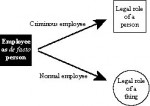The overall conclusion is that any institution or practice—human trafficking is a modern case in point—that, in effect, treats a person as a non-person, as only a means instead of as an end-in-themselves, violates their inalienable rights and is illegitimate, even with consent.
The Libertarian Case for Slavery: A Note on Nozick
This is a historically important paper, by one “J. Philmore,” arguing along with Robert Nozick from a free-market libertarian viewpoint that the self-sale contract and the current employment or self-rental contract are on the same moral footing.
Listen Libertarians! Part IV
In this Part IV, we consider the rather fake “inalienable rights” theory of classical liberal/libertarian thought that is consistent with a civilized voluntary slavery contract, a nondemocratic pact of subjection, and a coverture marriage contract, all of which are outlawed in the advanced democracies.
Inalienable Rights: Part I The Basic Argument
What is the inalienable rights theory that descends from the Reformation through the Enlightenment and that answers the classical apologies for slavery and autocracy based on implicit or explicit voluntary contracts?
Why was Slavery Wrong? Involuntariness or Treating Persons as Things?
“Involuntariness” is the usual answer.
Indeed, classical liberalism takes the most basic framing of a social question as: “consent or coercion?” In this view, democracy is characterized as government “with the consent of the governed” so slavery and non-democratic government were both condemned for the lack of consent.
This common condemnation of slavery on the basis of involuntariness has caused a large amount of intellectual history to just go “down the memory hole.” Those who routinely condemn involuntary slavery have either forgotten or never knew that from Antiquity down almost to the present there have always been those pro-slavery writers who: (1) presented a defense of slavery based on consent or contract, and (2) interpreted much of historical slavery as being based on implicit or explicit contracts.
My focus here is not on (2), the empirical question of whether or not any historical slavery could be interpreted as being voluntary, but (1), the fact of intellectual history that so many classical authorities defended slavery if based on consent.

